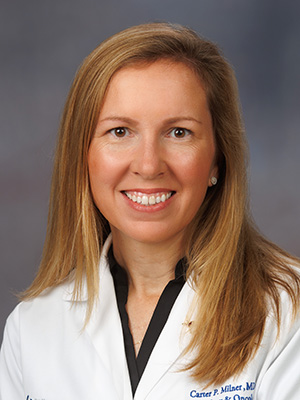Milner to co-direct Cancer Institute BMT Service, head CAR-T Service
Dr. John Ruckdeschel, University of Mississippi Medical Center Cancer Institute director, recently named Dr. Carter Milner co-director of the University of Mississippi Medical Center’s Bone Marrow Transplant Service and director of its CAR-T Service.
Ruckdeschel, professor of hematology and oncology, said, “The whole field of intensive therapy for hematologic malignancies is in a rapid state of flux with the developments in CAR-T therapy. Dr. Milner’s enthusiasm and knowledge are just what we need to bring together this very complex new program and to fully integrate it with our existing stem-cell transplant efforts.”
Milner, assistant professor in the Division of Hematology and Oncology, works primarily with patients with leukemias, lymphomas and myelomas. She’s cared for many who received stem cell transplants.

“This team is very effective and I’m privileged to be part of it,” she said. As co-director of the BMT Service with Dr. Carolyn Bigelow, professor of hematology and oncology, she will work with the team to provide allogeneic, autologous and haploidentical transplants.
The team already has started a follow up clinic for adult patients where needs specific to transplant patients can be more quickly addressed.
As director of the CAR-T Service, she’ll work with adult and pediatric hematologists/oncologists to set the procedures and standards to use this new cancer therapy. Chimeric antigen receptor T-cell therapy is a new immunotherapy. Doctors use a patient’s own immune cells to create a therapy that treats cancer. The U.S. Food and Drug Administration has approved CAR-T therapies for certain types of leukemias and lymphomas.
“This is the future of cancer therapy,” Milner said. “We’ve been selected as a site for Novartis, which owns Kymriah.” UMMC currently is pursing certification as a site for CAR-T cell therapy.
“Many patients who didn’t have an option, now have one,” she said.
The UMMC team hopes to begin offering the therapy later this year.

